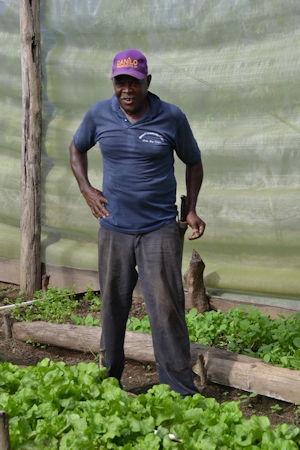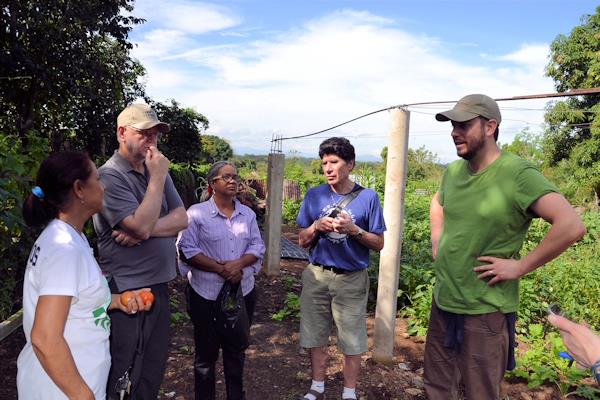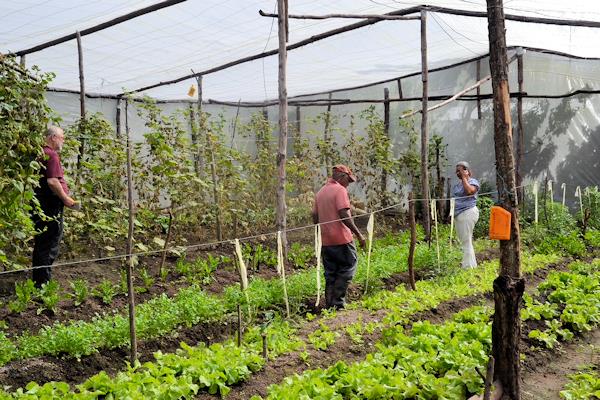Five years of work and eight visits by Rotary Club of Everett members will soon yield crops for needy farmers in the Dajabón region of the Dominican Republic.
The harvest: grants totaling nearly $107,000 from the Rotary Foundation, Everett-area Rotary clubs, Rotary District 5050 and more to help low-income Dominicans build greenhouse gardens where they will raise vegetables to eat and sell.
The seeds were planted in June 2015, when Everett Rotarians Ed Petersen, Julie Herber and Greg Lineberry traveled to the Caribbean nation seeking a new global outreach project. They visited local Rotaries, including one in remote northern Dajabón.
Rotarians there had five project ideas ready for trial. “We just hit it off with them,” said Petersen, a past Everett Rotary president who serves as strategic director for Housing Hope in Everett. Among those projects was a plan to help local people build small, irrigated “greenhouse gardens” where they could grow vegetables. The first gardens would be built in Los Miches, a low-income community.
Back in Everett, the Rotary World Community Service Committee approved the project, and club representatives returned to Dajabón in October to kick things off.
In a meeting with local residents, Dajabón Rotarians and members of Centro de Madres, a local service organization, a plan was settled to create ten gardens, each covering 300 square meters (about 3200 square feet). The trial was funded with a $5,000 grant from the Everett Rotary, matched by Rotary District 5050, which includes parts of Washington and British Columbia.
It wasn’t only gardens that brought the clubs together. Dominicans love baseball, and Rotarian George Bowden recalls that a gift of Seattle Mariners baseball caps helped cement the connection between the Everett and Dajabón clubs.

Carlos Martinez, the first garden owner in Los Miches, Dominican Republic.
Garden training was provided through INFOTEP, a local institution specializing in agriculture education. The Dominican Ministry of Agriculture provided technical assistance and seeds. Participants helped each other build their gardens.

A garden gathering: Manuela Rodriguez, the first garden owner in La Vigia, speaks with (left to right) Ed Petersen of the Everett Rotary; Ana Carrasco, Dajabon Rotary Project Leader; Dr. Jose Luis Garcia, agriculture specialist at Washington State University; and Anthony Gromko, WSU microloan specialist.
There were challenges. A hurricane tore down the wooden poles supporting the garden cover nets. Concrete supports fixed that. Two families were unable to continue the work due to health challenges. What were planned as loans for the gardeners became grants. But in the end, six families built successful gardens, which continue to operate in 2021.
Everett Rotarians continued to visit in the years that followed. As they looked to replicate the pilot project in nine new villages, however, issues arose that couldn’t be fixed with a shovel. The Rotary Foundation requires that finances for such projects be channeled through a local certified financial institution (CFI). Several were proposed but didn’t qualify. Rotary contacts back home in Washington came through.

Everett Rotary’s Ed Petersen (left) visits the garden of Francisco Espinal (center) with Ana Carrasco, Dajabon Rotary Project Leader.
Larry Jubie, a former Rotary District 5050 Governor and member of the Marysville Rotary, suggested a group called Rotary Foundation Cadre could help. Then Wally Gardner, a speaker before the Everett club, located a CFI-certified financial organization called Banfondesa.
More help came from Everett Rotarian Paul Pitre, chancellor at Washington State University (WSU) in Everett. Pitre connected the team with Anthony Gromko, a WSU expert in micro-credit, and WSU agriculture expert Dr. José García‑Pabón, to help with the project. Paul, Anthony, Jose, Julie and Ed’s wife Carol visited Dajabón in 2019. It was Petersen’s seventh trip.
The Covid pandemic cancelled a planned 2020 visit. But on December 14, 2020, big news: the Rotary Foundation granted $45,000 in matching funds to greatly expand the garden loan program. The full list of donors includes:
Rotary Club of Everett $ 15,000
South Everett/Mukilteo Rotary $ 5,000
Lake Stevens Rotary $ 5,000
Everett Port Gardner Rotary $ 5,000
Rotary District 5050 $ 30,000
Rotary Foundation $ 45,000
Rotary Club of Dajabón $ 865
Rotary District 4060 $ 1,000
Total $106,865
“We’re going to do 60 gardens in 2021,” Petersen said. “When the first phase of 20 gardens is completed, we’ll release the funds for 20 more.”
Residents building the gardens will receive a three-year loan from Banfondesa. The money repaid will then go into a revolving loan fund. Peace Corps members will be involved. Everett Rotarians will continue to visit, document and support the project and help the Dajabón Rotary with management and reports to the Rotary Foundation.
“Our purpose is to train the garden owners in entrepreneurship,” Petersen added. “They will learn agriculture production, accounting and marketing and sales skills, to set them up for long-term success.”
Another benefit is the partnerships Rotary has created with other Rotary clubs, the Peace Corps, and other service organizations. “The foundation has been laid in Dajabón for other kinds of benefits,” Petersen said. “We have access to future grant opportunities in education, in health and the environment, in reforestation. We have built a foundation that opens opportunities to do more.”
“There is a commonality among Rotarians and Rotary Clubs worldwide,” said Bowden. “Whether it’s vaccinations against polio, or clean water, or in this case, gardens. At that first meeting in Los Miches somebody said, ‘why are you doing this?’ And I thought, ‘because you’re our neighbors.’”